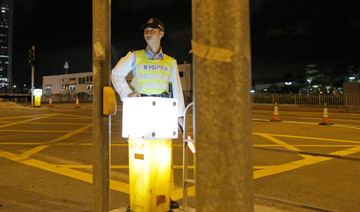DAVOS: During a discussion at the World Economic Forum Annual Meeting on Wednesday, a panel of regulators and other experts stressed the importance of striking a balance between privacy and protection when addressing user safety in the digital world.
The participants in a session titled “Tackling Harm in the Digital Era” discussed the challenges related to harmful online content and conduct, and the role of public bodies in tackling the issue.
“Digital harm is changing faster than we realize,” said Pranjal Sharma, a contributing editor at Indian magazine BW Businessworld.
The challenge will be to understand “how we can come together to make sure all stakeholders and all players have a common idea to ensure the internet is a safe space for everybody,” he added.
The panelists agreed that “regulators walk a fine line” when attempting to govern the internet, adding that “there is not a black and white answer” to the challenges. They said experts have repeatedly highlighted the importance of anticipating and preventing problems, and that governments, the private sector and civil society all have important roles to play in tackling online abuse and exploitation, particularly when it threatens the most vulnerable in society.
Experts have warned against the fragmentation of regulatory practices, calling for leaders and regulators to develop a global framework of systems and processes that international stakeholders can agree on.
“We expect a global network of online safety regulators over the coming years,” said Julie Inman Grant, Australia’s eSafety Commissioner.
In June 2021, the WEF announced the launch of a Global Coalition for Digital Safety to help accelerate public-private cooperation in efforts to tackle harmful content online. The panelists stressed the importance of capitalizing on this initiative, pointing out that self-regulatory practices “have failed” and governments should adopt “a top-down approach.”
They also highlighted the growing role of users in efforts to tackle harmful content but warned that computer literacy alone is not a “silver bullet” for addressing the issue.
“User empowerment and supporting the users in how, for example, they want their data to be used, is also important but I think is also overemphasized in this debate,” said Melanie Dawes, chief executive for British competition authority Ofcom. “I do not think we can expect users to protect themselves.”
Grant said that if the world wishes to properly address the challenges, technological innovations should be used to build safer digital spaces. Risk-assessment tools and safety by design are some of the practical solutions the panelists suggested regulatory bodies and technology companies should be focusing on.
“We are never going to have a safer online world if the fundamental building blocks are not built with safety and human centricity in mind,” Grant said.
The panel also noted that young people are accessing the digital world at an ever-younger age and, as a result, parents are increasingly concerned about the safety of their children, particularly because they themselves often “feel outpaced” by technological innovations.




























